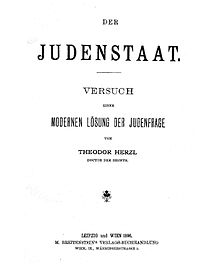Der Judenstaat: Difference between revisions
m Reverted edits by 67.70.38.8 (talk) to last version by Helpful Pixie Bot |
Wikipedia:RedLink |
||
| Line 15: | Line 15: | ||
The creation of a Jewish State may be a possible solution to the problem faced by Europe's Jews. |
The creation of a Jewish State may be a possible solution to the problem faced by Europe's Jews. |
||
Herzl opposed the efforts already made by Zionist groups to settle Jews in Ottoman-controlled Palestine, arguing that "important experiments in colonization have been made, though on the mistaken principle of a gradual infiltration of Jews. An infiltration is bound to end badly. It continues till the inevitable moment when the native population feels itself threatened, and forces the government to stop a further influx of Jews. Immigration is consequently futile unless we have the sovereign right to continue such immigration.” (Quoted from The Jewish State, translated by Sylvie d’Avigdor, Nutt, London, 1896, and reprinted by Dover, 1988, p. 95.) |
Herzl opposed the efforts already made by [[Zionist]] groups to settle Jews in Ottoman-controlled Palestine, arguing that "important experiments in colonization have been made, though on the mistaken principle of a gradual infiltration of Jews. An infiltration is bound to end badly. It continues till the inevitable moment when the native population feels itself threatened, and forces the government to stop a further influx of Jews. Immigration is consequently futile unless we have the sovereign right to continue such immigration.” (Quoted from The Jewish State, translated by Sylvie d’Avigdor, Nutt, London, 1896, and reprinted by Dover, 1988, p. 95.) |
||
For this reason, Herzl, both in ''Der Judenstaat'', and in his political activity on behalf of Zionism, concentrated his efforts on securing official legal sanction from the Ottoman authorities. |
For this reason, Herzl, both in ''Der Judenstaat'', and in his political activity on behalf of Zionism, concentrated his efforts on securing official legal sanction from the Ottoman authorities. |
||
Revision as of 05:47, 27 August 2012

Der Judenstaat (German, "The State of the Jews", also sometimes translated as "The Jewish State") is a book written by Theodor Herzl and published in 1896 in Leipzig and Vienna by M. Breitenstein's Verlags-Buchhandlung. It is subtitled with "Versuch einer modernen Lösung der Judenfrage", "Proposal of a modern solution for the Jewish question", and originally called "Address to the Rothschilds" referring to the Rothschild family banking dynasty.[1]
It is considered one of the most important texts of early Zionism. As expressed in this book, Herzl envisioned the founding of a future independent Jewish state during the 20th century. He argued that the best way to avoid anti-Semitism in Europe was to create this independent Jewish state. Herzl, who had lived as a secular, largely assimilated Jew, was fluent in neither Hebrew nor Yiddish. His lack of contact with Jewish culture and intellectual currents, and his limited contact with Jews less assimilated than he prior to hitting upon the idea of a Jewish return to Zion, led him to imagine that popular Jewish support for a Jewish State elsewhere than in Palestine was conceivable.[needs citation] In Der Judenstaat, Herzl noted the possibility of a Jewish state in Argentina.
Herzl popularized the term "Zionism", which was coined by Nathan Birnbaum. The nationalist movement culminated in the birth of the State of Israel in 1948, though Zionism continues to be connected with political support of the State of Israel.
Main argument
The main argument of the book is as follows. After centuries of various restrictions, hostilities, and occasional pogroms, the Jews of Europe have been reduced to living in Ghettos. The higher class is forced to deal with angry mobs and, so experiences a great deal of discomfort; the lower class lives in despair. Middle-class professionals are distrusted, and the statement "don't buy from Jews" causes much anxiety among Jewish people. It is reasonable to assume that the Jews will not be left in peace. Neither a change in the feelings of non-Jews nor a movement to merge into the surrounds of Europe offers much hope to the Jewish people. Jews "introduce" anti-Semitism wherever they go:
- "The Jewish question persists wherever Jews live in appreciable numbers. Wherever it does not exist, it is brought in together with Jewish immigrants. We are naturally drawn into those places where we are not persecuted, and our appearance there gives rise to persecution. This is the case, and will inevitably be so, everywhere, even in highly civilised countries - see, for instance, France - so long as the Jewish question is not solved on the political level. The unfortunate Jews are now carrying the seeds of anti-Semitism into England; they have already introduced it into America."[2]
The creation of a Jewish State may be a possible solution to the problem faced by Europe's Jews.
Herzl opposed the efforts already made by Zionist groups to settle Jews in Ottoman-controlled Palestine, arguing that "important experiments in colonization have been made, though on the mistaken principle of a gradual infiltration of Jews. An infiltration is bound to end badly. It continues till the inevitable moment when the native population feels itself threatened, and forces the government to stop a further influx of Jews. Immigration is consequently futile unless we have the sovereign right to continue such immigration.” (Quoted from The Jewish State, translated by Sylvie d’Avigdor, Nutt, London, 1896, and reprinted by Dover, 1988, p. 95.)
For this reason, Herzl, both in Der Judenstaat, and in his political activity on behalf of Zionism, concentrated his efforts on securing official legal sanction from the Ottoman authorities.
References
- ^ Herzl, Theodor (1988) [1896]. "Biography, by Alex Bein". Der Judenstaat. transl. Sylvie d'Avigdor (republication ed.). New York: Courier Dover. p. 40. ISBN 978-0-486-25849-2. Retrieved 2010-09-28.
{{cite book}}: Cite has empty unknown parameters:|lastauthoramp=and|separator=(help); External link in|chapterurl=|chapterurl=ignored (|chapter-url=suggested) (help); Unknown parameter|trans_title=ignored (|trans-title=suggested) (help) - ^ Herzl, 'Der Judenstaat', cited by C.D. Smith, 'Palestine and the Arab-Israeli conflict', 2001, 4th ed., p.53
